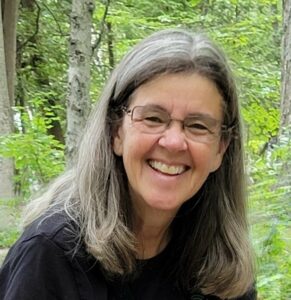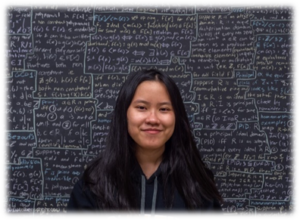“Diversity is a strength. It leads to more innovation and better outcomes. It’s not just the right thing to do; it’s the bright thing to do!”
— Sarah Paquet, Executive Vice-President, Shared Services Canada.
Wendy Powley, Assistant Professor at the Queen’s School of Computing, is a passionate advocate for expanding gender diversity in the field of computing. According to Statistics Canada, while 34% of Canadians with a STEM degree are women, women make up only 23% of Canadians working in science and technology. Professor Powley is one of the founders of the Canadian Celebration of Women in Computing conference, or CAN-CWiC. CAN-CWiC is an event for those identifying as female, non-binary, genderqueer, or male allies who are interested in advocating for gender equality in the computing discipline. CAN-CWiC has been running since 2019 and is now a premiere Canadian computing conference for Women in Technology. This annual event brings together leaders in research, education and industry from across Canada.

In addition to her work with CAN-CWiC, Prof. Powley has been one of the recipients of the Google exploreCSR awards for the second year in a row. This funding is used to support intriguing projects that capture the interest of female-identifying students to pursue graduate studies and research careers in computing.
The 2022 Google exploreCSR project connected female undergraduate students with graduate mentors to collaborate on research in areas of artificial intelligence, cybersecurity, medical informatics, and self-driving vehicles, to name a few. At the Mentorship presentation showcase on August 23, 2022, the mentees shared their reflections on their research, what they have learned, and their future plans.
Here are their testimonials!
Driver-Centric Vehicles to Intelligent Mechanical Devices
Mentor: Lama Moukahal

Mentee: Mercy Doan

Mercy Doan:
A Few Words About My Research
Seven years ago, studies showed cyber experts could remotely control media players, steering, engine, transmission and braking systems in vehicles.
The central issue is that hacking capabilities become better over time, while the security of the software decays. Cyber research is difficult due to lack of good data – companies lock accurate and sensitive information behind security walls.
My Mentorship Take-away
I learned what the research experience is like, explored different research papers and what they are used for, learned how to identify a good research paper. I learned that the best method of finding the right research topic is to contribute to a field that genuinely interests you. Research is very self-motivated.

The benefits of this mentorship were developing a researcher mindset and then using these methods to solve practical problems. I also learned to be less intimidated by research and feel confident that I can contribute more. Due to this mentorship experience, I now consider graduate school a potential option for me.
Mentee: Huilin Xu

Huilin Xu:
A Few Words About My Research
This research is about driver centric vehicles and intelligent mechanical devices. How important is cybersecurity for autonomous vehicles? The answer is: extremely important, because autonomous vehicles rely on software and technology, and so are easily exposed to vulnerabilities and attacks.

My Mentorship Take-away
Before this mentorship, I was thinking about my future path, whether it will be cyber security or software design. I concluded that software design is the path to embark on. I also learned through this mentorship to believe in myself: when I began struggling with a problem, I became confident that the solution could be found with a bit of persistence. I also affirmed that you should enjoy your topic of research, without an interest in the topic, research can start feeling quite torturous.
My next step will be to apply to Graduate school and pursue software engineering. I hope that within 5 years I could develop an app for Apple, or Amazon, Google, etc.
This mentorship made me open to more challenges and opportunities and I’m very much looking forward to the future.
Federated Learning
Mentor: Xu Wang

Mentee: Yianqi Liang

Yianqi Liang:
A Few Words About My Research
“Federated learning” is when a server propagates a global model to multiple clients for training and testing, and then collects the training data to update the global model. In this project, we focused on the design and implementation of the reinforcement learning model.
My Mentorship Take-away
I was exposed to a completely new field, and I soon realize that my learning ability has improved. I learned and observed.
I thought that watching videos was the best way to learn, because it is sometimes hard for me to understand the core content of the paper, but after speaking to my mentor, I found that combining videos and research papers was the best way to find the information I was seeking. I will now focus more attention to reading research papers in my future studies.
And for my future, I would like to continue my studies in this research direction. These four months of study have given me knowledge of the basic process. I hope to progress into this area of research and be able to write code by myself. This experience has broadened my knowledge and provided background for my work in the future.

Machine Learning and Artificial Intelligence in Cybersecurity
Mentor: Maryam Davari

Mentee: Sydney Sherek

Sydney Sherek:
A Few Words About My Research
I learned that one of the biggest challenges in the topic of cybersecurity is the evolution of hackers. The constant changes to attack strategies, combined with the innovative tools and techniques and vulnerability exploitation, has led to a major increase in cyber-attacks. Cyber intrusion encompasses many types of attacks which threaten the availability, integrity, and confidentiality of computer networks. There are attacks which aim to consume computer and network resources, such as denial of service.
My Mentorship Take-away
My main take away from this research was the beneficial impact that machine learning has on detection systems and on cyber security. Machine learning is going to be the future innovation in cybersecurity.
I learned to dissect and analyze research data. Being able to read complicated graphs and understand the complicated graphics in research papers was intimidating. Learning how to break down this information really helped me to better understand the subject.
The algorithms that I learned about make their classification decisions as either safe or malicious based on different features in data. The generation of datasets is something that I could be interested in doing in the future.
I learned so much for this experience. It taught me not only the importance of machine learning, but also cyber security as a whole.
Mentee: Yi Kuang

Yi Kuang:
A Few Words About My Research
Machine learning in cybersecurity is becoming more and more important in social media. For example, when you’re sending out a job application or making a transaction on networking sites, there might be a risk of information being leaked, as well as a probability for fraud identity on the social board platform.
The attacks service is a set of points where an attacker tries to get into that system to affect it or extract data.
After I reviewed numerous threats in social networking, I chose to go deep into the social board detection topic and how to find the figure account on the social media platform.
It’s an interesting topic to learn. I liked learning how scholars choose the most suitable features or data that need to be extracted from large data sets to construct their models.

My Mentorship Take-away
I enjoyed the research and in the future I would like to continue my graduate studies in artificial intelligence and information. I would like to explore more in the topic of new media integration with artificial intelligence and machine learning in computer science.

Distributed Security in Vehicular Communications
Mentor: Anika Anwar

Mentee: Ximing Yu

Ximing Yu:
A Few Words About My Research
My topic of research is small device security with a focus on solutions to detecting and preventing malware in mobile smart devices.
Bot Nets are considered the biggest challenge in mobile based botnet. The bot master can distribute their commands via insecure HTTP request, SMS, Bluetooth, etc. The bot master exploits operating system and configuration vulnerability to compromise devices.
Detecting and preventing malware is not a trivial task. Market stores are all responsible for keeping the mobile devices free from malware for the end user. It is essential for these vendors to be aware of the security measures of their mobile device, such as installing anti-malware. By conducting research, I learned about multi-layer integrated security solutions.
My Mentorship Take-away
I think one of the most important aspects of research is to be patient. From my experience, when I have a very long paper, I would begin by patiently scanning the intro, the conclusion, and the section titles, then break them down into small pieces and examine each part one by one.
Through the mentorship program my mindset has changed a lot.
I have no previous experience doing university level research and little knowledge in the field of cybersecurity, so it took time to feel comfortable doing it and I would say I now enjoy reading research papers and doing research.

I’m now very interested in pursuing a Master’s degree in the security field as I found security issues go hand in hand with software development. In the future, I would love to dig deeper into researching how to ensure a safe web and mobile software development, and hopefully make some practical contributions to the research field and the industry.
Mentee: Qianran Liao

Qianran Liao:
A Few Words About My Research
After looking at the various hybrid security topics, we decide to choose mobile malware and its possible solutions.
We studied and researched existing attacks towards mobile devices, especially for Android devices, as well as the trend of mobile malware, and figured out possible solutions to prevent the attacks.
Malware uses information from devices and can predict a user’s activities. Spyware is a malware which attacks a victim’s device to control user activities, such as location contacts, calls, testing, emails, etc. In some cases, it can send such information to another location where available networks can take control without the user’s knowledge.
My Mentorship Take-away
The mentorship program enhanced my research skills. I learned how to do research online to find formal academic resources, learned how to give an academic research presentation, how to summarize an academic paper and extract the core knowledge. Finally, I learned how to write a research proposal in the format of an academic paper.
I now feel more interested in computing and computer science. And for the future, I plan to pursue a graduate degree in a computing related field, potentially hybrid security.

Medical Informatics – Breast Conserving Surgery
Mentor: Laura Connolly

Mentee: Olivia Radcliffe

Olivia Radcliffe:
A Few Words About My Research
My research was in navigated resection cavity inspection for breast conserving surgery. The goal was to determine the feasibility of adding navigation to a section cavity inspection.
To do this, I created a platform for simulation, navigated the section cavity inspection, and ran a user study to evaluate it for clinical application.
The best resection cavity is the space or the gap in the breast after a tumor is removed and cavity inspection is a method of detecting residual cancer directly in the resection cavity.
My Mentorship Take-away
I learned how to use a 3D Slicer, which is a medical imaging software, and how to develop my own module. I learned many different medical techniques used for margin assessment. And lastly, I learned how to write a conference paper.
My future plans include taking the undergraduate thesis class next semester.
Professor Powley on the realities of research work:
Your research has to be in an area that you are passionate about, because you will spend a lot of your time doing research, it’s a constant thing. It’s constantly in your head . . . research is one of those things that you don’t do at the lab and then go home at night and forget about it. You’re always thinking about what you’re going to do next, and you’re always trying to solve problems.
And if you’re not passionate about what you’re doing, this is when students get in four or five years in graduate school and realize they’re stuck. The wheels are turning, and they’re not getting anywhere. Oftentimes it’s because the student has lost their passion for the subject area that they’re working in. If you ever do get into such position, my big piece of advice is: “Just get the darn thing done!”
Tell your supervisor that you’re going to get your thesis complete within the year. Make a plan for it. Don’t let it defeat you. And don’t waste five years of your life to get to that point where you think “I’m not good enough to do this. I can’t do this. I don’t know the answers to these problems. I’m stuck.” You ARE good enough to do it. And there’s always a way to finish that degree. Know that there’s a way out and you will get the degree and you will move on, but don’t give up, OK? Don’t do that.

Professor Powley’s feedback on the Google Mentorship Presentations:
I am blown away at the way the students presented. They already have superb presentation skills and they are only in 2nd year!
It sounds like the mentees picked up some good skills and some excellent knowledge that they wouldn’t have otherwise. Now I know that the process worked.
If you have any questions or want to talk about things further, you know where to find me. And you know where to find your mentors.
I hope you all have a great next semester.
The intriguing world of computing! It’s simple yet so overwhelming . . . it’s the endless possibilities that permeate every aspect of our lives! Many decades ago, Professor Powley became passionate about those endless possibilities. By tirelessly seeking out resources and building foundations for the new generation of students, she continues to light the torch and pass it on from one student to another, to another, to another, to another, to another, to another…